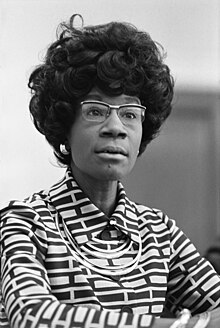Let’s talk about women in politics.
Ramping up to the 2016 caucuses, we have two female presidential candidates: Carly Fiorina (R) and Hillary Clinton (D). Carly Fiorina, formerly the CEO of Hewlett-Packard (HP), had gained early steam in the Republican presidential debates proving herself with actual policies and plans — but has fallen out of favor in the polls. Hillary Clinton, former First Lady, Secretary of State, and US Senator, is not new to the presidential race and is facing tough numbers as of late against Bernie Sanders.
In my Millennial mind, I’m thinking, “Finally! The first time there are two female presidential contenders!” To my great surprise, this is not true.
Pioneering Women of American Congress
Back in 1972, two groundbreaking women took a chance at becoming the first female — and minority — president: Shirley Chisholm, the first Black woman elected to Congress, and Patsy Mink, the first Asian-American woman elected to Congress.

Shirley Chisholm (D-NY)
An educator turned politician, she ran her US congressional race in Brooklyn back in 1968 under the slogan “unbought and unbossed.” She was like an original political outsider, irking the status quo politicians of the late sixties: old, male and white. But that didn’t dismay her; just like in her slogan, she worked her way onto the Education and Labor Commitees and championed early education and child welfare.
When she began her political career, running for NY state legislature, she saw a need for the people to be truly represented and fight for their needs. A skilled debater in college, Chisholm had the prowess to enter a tough political atmosphere and make a difference. She helped establish the WIC program, the Congressional Black Caucus, and the National Women’s Political Caucus.
—

Patsy Mink (D-HI)
As a high-achieving Japanese-American high school student in WWII Hawaii, who was class president and valedictorian, it’s hard not to see Patsy Takemoto Mink’s bright future in politics. She fought and beat segregation policies at University of Nebraska by building coalitions between the students, faculty, parents, and even corporations. This ability to unite different stakeholders played a strong role in her political career: solidifying the Democratic Party’s stance on civil rights in 1960, championing Title IX and introducing the Early Childhood Act and Women’s Educational Equality Act. She also readily questioned the creation of the Department of Homeland Security with concerns of people’s civil rights, citing what she had witnessed of the Japanese internment camps in her youth.
